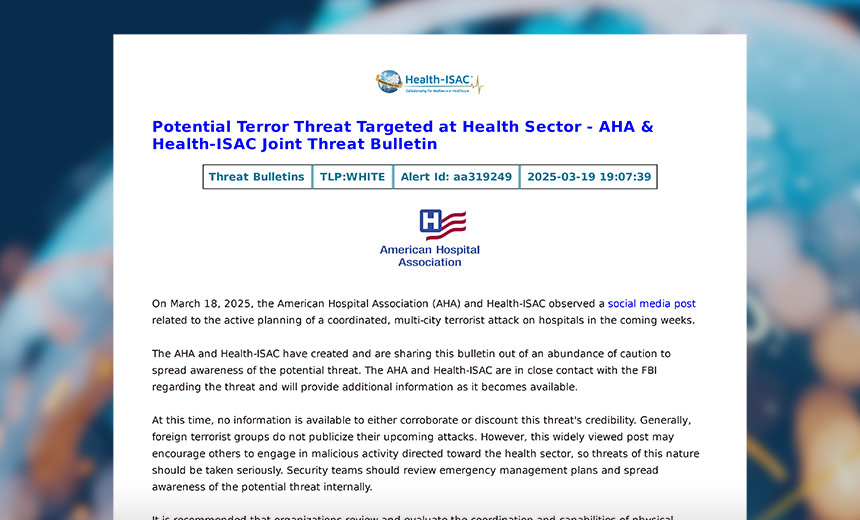Attack Surface Management,
Healthcare,
Industry Specific
Health-ISAC and AHA Call for Enhanced Security Amid Terror Threats

Recent social media posts indicating planned coordinated terrorist attacks on hospitals in mid-tier U.S. cities have prompted warnings from healthcare authorities. The Health Information Sharing and Analysis Center (Health-ISAC) and the American Hospital Association (AHA) are urging healthcare facilities to strengthen both physical security and cybersecurity, in addition to reviewing emergency management response plans.
A joint alert released late Wednesday stated that Health-ISAC and AHA are collaborating closely with the FBI to gather more information and assess the legitimacy of these threats. Historically, foreign terrorist organizations tend to keep their plans confidential, but recent posts threatening violence directed at hospitals with populations between 100,000 and 500,000 could potentially motivate individuals to perpetrate attacks against the healthcare sector.
As of Thursday, no corroborative evidence has emerged to verify the authenticity of the threats, although discussions with FBI officials are ongoing. John Riggi, AHA’s national advisor for cybersecurity and risk, confirmed that they are maintaining direct communication with FBI headquarters as investigations unfold. Riggi emphasized that while it is crucial not to elevate unverified threats, it is equally important to inform the healthcare community about potential dangers and offer guidance on preventive measures.
The joint advisory from Health-ISAC and AHA referenced detailed reports from social media, including a post from American Kinetix, a company comprised of former CIA and Joint Special Operations Command personnel. The post flagged a “highly credible threat” involving ISIS-K, claiming imminent coordinated attacks on hospitals across the U.S.
These potential attacks might involve the use of vehicle-borne improvised explosive devices followed by armed assaults and hostage situations. The post further suggested that the planned attacks could serve as a precursor to larger, more complex operations by groups like Al-Qaeda, emphasizing the vulnerability of hospitals as “soft targets” characterized by their low security and high foot traffic.
In light of these developments, the AHA and Health-ISAC recommend that healthcare organizations actively assess their security coordination and emergency response readiness. By fostering stronger relationships with both local and federal law enforcement, hospitals may increase the efficiency of their responses in the event of an attack. Enhancing security presence in and around healthcare facilities may also serve as a deterrent to potential threats, Riggi advised, underscoring the need for vigilant yet composed readiness among hospital staff.
As of now, the FBI has yet to respond to inquiries about the credibility of these reported threats. Meanwhile, the ongoing situation highlights the critical need for the healthcare sector to remain vigilant and prepared against evolving threats in both physical and cyber realms.
